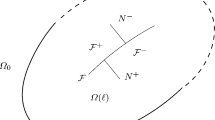Abstract
The crack healing process is studied theoretically on the basis of the extended the Thomson-Obreimoff model. The system free-energy F as a function of the crack lengthl and temperatureT is calculated using the self-consistent Einstein model. It is found that with the temperature increase, the energy barrier becomes lower and even disappears at the “healing” temperatureT=T h. It is demonstrated that the cracklattice trapping in the Obreimoff model is controlled by the free-energy barrier height AF(T). The latter exhibits the universal power-law behavior. On the basis of the results obtained, the crack healing time is evaluated.
Similar content being viewed by others
References
R. Thomson, C. Hsieh and V. Rana,J. Appl. Phys. 42, 3154 (1971).
J. W. Obreimoff,Proc. Roy. Soc. Lond. 127, 290 (1930).
K. Kitamura, I. L. Maksimov and K. Nishioka,Phil. Mag. Lett. 75, 343 (1997).
R. P. Feynmanm,Statistical Mechanics, p. 67, Benjamin, Massachusetts (1997).
L. A. Girifalco and V. G. Weizer,Phys. Rev. 114, 687 (1959).
Author information
Authors and Affiliations
Rights and permissions
About this article
Cite this article
Kitamura, K., Maksimov, I.L. & Nishioka, K. Temperature-dependent micro crack healing process. Metals and Materials 4, 1219–1222 (1998). https://doi.org/10.1007/BF03025997
Issue Date:
DOI: https://doi.org/10.1007/BF03025997




